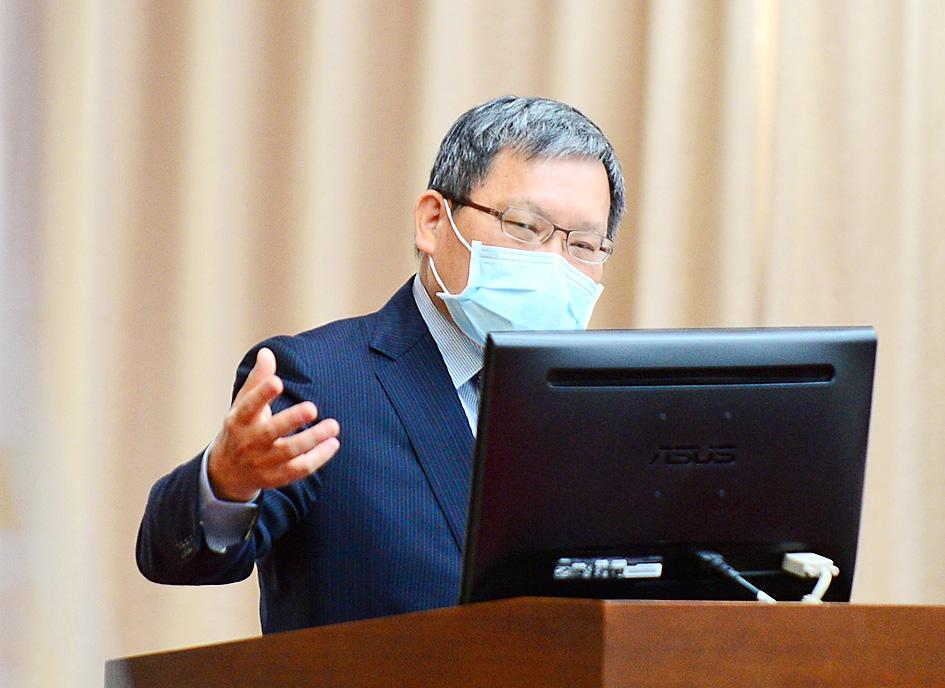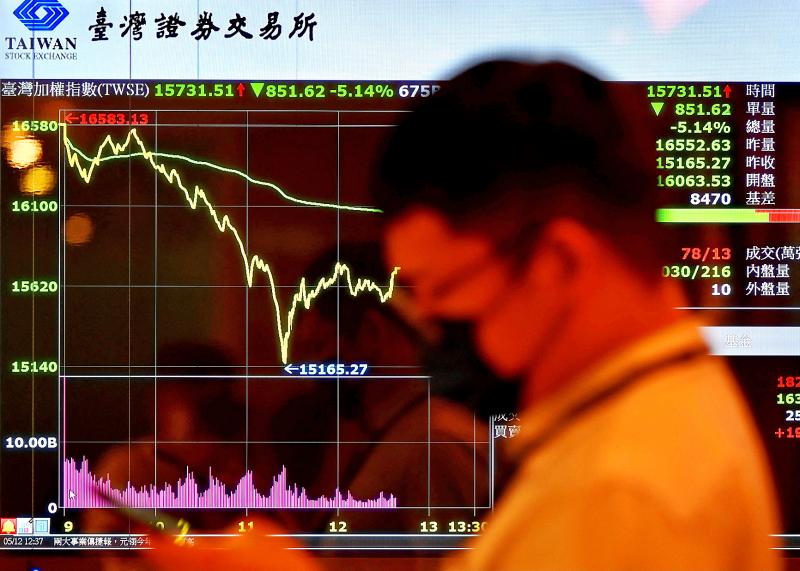The TAIEX yesterday sank by 680.76 points, or 4.11 percent, to close at 15,902.37 points, the second-
largest one-day drop after a fall of 696 points on Jan. 30 last year, amid concern over the rising number of local COVID-19 infections, analysts said.
The weighted index, which closed at 16,583.13 points on Tuesday, opened down and lost 300 points in the first 15 minutes of trading, before climbing to 16,550 points at 9:46am, Taiwan Stock Exchange (TWSE) data showed.

Photo: Wang Yi-sung, Taipei Times
However, it lost its footing again, plunging 1,400 points to 15,165.27 points at 11:25am. That represented a drop of 9 percent — the largest intraday fall in decades, TWSE data showed.
The TAIEX recovered on the back of a rebound in several big-cap shares, including Taiwan Semiconductor Manufacturing Co’s (TSMC, 台積電) and United Microelectronics Corp (UMC, 聯電), before ending the day at 15,902.37 points.
It was the second straight day that the index closed down, after plummeting 3.79 percent on Tuesday.

Photo: Sam Yeh, AFP
Turnover totaled NT$772.772 billion (US$27.64 billion), with foreign institutional investors selling a net NT$12.17 billion of shares, TWSE data showed.
More than 900 stocks retreated, including 140 whose shares sank by the daily cap of 10 percent, Prudential Financial Securities Investment Trust Enterprise Co (保德信投信) said in a statement.
“The stock market was comparatively calm in the first trading hour, but crashed later. Why? I think that was because some investors panicked amid speculation that Taiwan might raise its COVID-19 alert to level 3 soon and might even impose lockdowns,” Hua Nan Securities Investment Management Co (華南投顧) chairman David Chu (儲祥生) said by telephone.
Moreover, many investors faced margin calls by brokers to cover losses in their stock accounts, but as some could not come up with the money to meet the minimum requirement, brokers were forced to sell off their positions, which exacerbated the market’s decline, Chu said.
The level of margin debt totaled NT$257 billion on Tuesday, down by NT$12.7 billion from Monday and the most since October 2018, Chu said.
As the margin debt was expected to further drop yesterday amid the market rout, it is likely to lead to a bigger unwinding of leverage, he added.
The National Stabilization Fund Committee might convene a meeting soon to respond to the ongoing market rout amid rising COVID-19 infections and as global technology shares retreat, Minister of Finance Su Jain-rong (蘇建榮) said.
“The committee is likely to convene extraordinary meetings very soon in the face of panic selloffs of local shares,” Su said at a meeting of the legislature’s Finance Committee, with lawmakers across party lines asking if the government has measures in place to respond to the crisis.
The ministry has exchanged views on the issue with Vice Premier Shen Jong-chin (沈榮津), the head of the fund committee, Su said, while declining to give clear-cut answers.
The NT$500 billion stabilization fund last intervened on March 19 last year, when the TAIEX fell to near the 8,500-point mark, as global markets crashed after major countries imposed lockdowns to tackle the COVID-19 pandemic.
The fund exited the market in October last year, after the local bourse rallied to record highs, thanks to global rush orders for electronics used in laptops, tablets, TVs and other tech products.
A later report by the committee revealed that it shored up the local bourse by buying shares of TSMC, MediaTek Inc (聯發科), Hon Hai Precision Industry Co (鴻海精密) and other heavyweights.
The fund walked away with a handsome profit.
Asked whether it is time for the fund to step in now, Su said the committee has the final say and he is only one of the panelists.
Deputy Minister of Finance Frank Juan (阮清華), the fund’s executive secretary, called the panic selloffs unnecessary, adding that Taiwan’s economy expanded 8.16 percent in the first quarter and is gathering further steam moving forward.
Juan said that government agencies “are joining forces and will soon rein in resurgent local virus infections.”
The committee is closely watching local stock exchange, but the most urgent thing for investors now is to stay calm, he said.
Exports, a critical GDP component, surged more than 30 percent year-on-year last month, and should continue to grow by double-digit percentage points this month and beyond, he added.

Nvidia Corp chief executive officer Jensen Huang (黃仁勳) on Monday introduced the company’s latest supercomputer platform, featuring six new chips made by Taiwan Semiconductor Manufacturing Co (TSMC, 台積電), saying that it is now “in full production.” “If Vera Rubin is going to be in time for this year, it must be in production by now, and so, today I can tell you that Vera Rubin is in full production,” Huang said during his keynote speech at CES in Las Vegas. The rollout of six concurrent chips for Vera Rubin — the company’s next-generation artificial intelligence (AI) computing platform — marks a strategic

Enhanced tax credits that have helped reduce the cost of health insurance for the vast majority of US Affordable Care Act enrollees expired on Jan.1, cementing higher health costs for millions of Americans at the start of the new year. Democrats forced a 43-day US government shutdown over the issue. Moderate Republicans called for a solution to save their political aspirations this year. US President Donald Trump floated a way out, only to back off after conservative backlash. In the end, no one’s efforts were enough to save the subsidies before their expiration date. A US House of Representatives vote

REVENUE PERFORMANCE: Cloud and network products, and electronic components saw strong increases, while smart consumer electronics and computing products fell Hon Hai Precision Industry Co (鴻海精密) yesterday posted 26.51 percent quarterly growth in revenue for last quarter to NT$2.6 trillion (US$82.44 billion), the strongest on record for the period and above expectations, but the company forecast a slight revenue dip this quarter due to seasonal factors. On an annual basis, revenue last quarter grew 22.07 percent, the company said. Analysts on average estimated about NT$2.4 trillion increase. Hon Hai, which assembles servers for Nvidia Corp and iPhones for Apple Inc, is expanding its capacity in the US, adding artificial intelligence (AI) server production in Wisconsin and Texas, where it operates established campuses. This

US President Donald Trump on Friday blocked US photonics firm HieFo Corp’s US$3 million acquisition of assets in New Jersey-based aerospace and defense specialist Emcore Corp, citing national security and China-related concerns. In an order released by the White House, Trump said HieFo was “controlled by a citizen of the People’s Republic of China” and that its 2024 acquisition of Emcore’s businesses led the US president to believe that it might “take action that threatens to impair the national security of the United States.” The order did not name the person or detail Trump’s concerns. “The Transaction is hereby prohibited,”